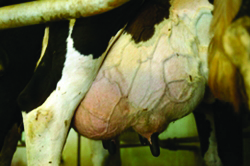American scientists have partnered with the local dairy sector stakeholders to fight diseases that are hurting the country’s milk production and quality, especially mastitis.


American scientists have partnered with the local dairy sector stakeholders to fight diseases that are hurting the country’s milk production and quality, especially mastitis.
According to Dr. Pie Ntampaka, a veterinary officer in Nyagatare District, mastitis, a bacterial disease that causes inflammation of the mammary glands and the udder, accounts for 70 per cent of the losses in the dairy industry.
Mastitis can also be caused by chemical, mechanical or thermal injury on the cow’s udder.
"This disease is one of the major factors responsible for low milk production, profitability and food insecurity in the country,” Ntampaka added.
The problem could, however, reduce greatly as the partnership with scientists from United States’ University of California and Global Health Share initiative will support a capacity building programme to fight the disease. The project will be undertaken for the next 16 weeks or four months and will cover the whole country.
The US experts will work with Rwanda Dairy Competitiveness programme, the Rwanda Agriculture Board, local scientists, farmers and stakeholders along the supply value chain to ensure good animal husbandry practices, according to Frank O’Brien, the Rwanda Dairy Competitiveness programme chief of party.
"Eradicating the disease will enhance milk output and quality along the value chain, as well as boost profitability of the dairy industry,” Professor James Cullor, the director of dairy, food safety laboratory at the University of California, said during a stakeholders’ training on how to combat mastitis in Kigali on Tuesday.
He said if the disease is not controlled, it will continue to hurt animal health, compromise public and food safety and consumer confidence.
"It is important that farmers gain skills to eradicate diseases that cause losses on the farm. This will improve dairy industry output and ensure food safety,” Nandi Somen, the managing director of Global Health Share Initiative, said.
Setting up Rwanda Mastitis Council
Meanwhile, plans are underway to establish a mastitis national council, which will co-ordinate the fight against the disease, according to Christine Kanyandekwe, the Rwanda Agriculture Board deputy director general.
"We are working with development partners and sector stakeholders to establish the council...Fighting mastitis will reduce poverty and improve farmers’ livelihoods, which is one of the main goals of the country’s growth blueprint, EDPRS2,” Kanyandekwe said.
Rwanda produced 503,130 litres of milk last year, up from 442,337 litres in 2011. The increase was attributed to the Girinka programme, under which thousands of households have received free cows since 2006.


